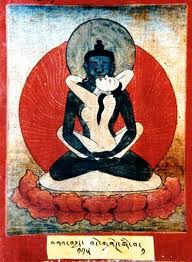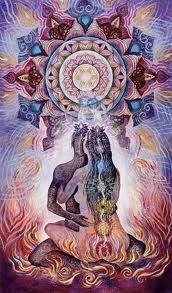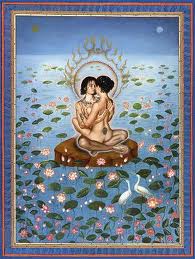|
|
 |
Do you know the difference between Tantra and Sexual Yoga?  Most Westerners need to be wary of sexual
addiction, which emphatically is not tantra yoga or sexual yoga. What most of us really need is an introduction
to truly tantric relationships, keeping in mind that ritualistic tantric Buddhism has
nothing to do with ordinary ways of making love. Most Westerners need to be wary of sexual
addiction, which emphatically is not tantra yoga or sexual yoga. What most of us really need is an introduction
to truly tantric relationships, keeping in mind that ritualistic tantric Buddhism has
nothing to do with ordinary ways of making love.
Lama Yeshe's "Introduction to Tantra" has been out for many years.
Why review it now? Because classics need and deserve to be re-read,
re-considered and re-absorbed. How many times have we read great books
- like this one - and promised ourselves we'd read it again, like, really really soon.
With
my own broken promises to myself in mind, I recently revisited "Introduction
to Tantra." Re-reading classics is a good way of checking up on ourselves - how
much have we really imbibed, how much have we forgotten, and how much seems like we never saw/read/heard
of it before? In the latter category, I was struck by a sentence at the book's beginning: "There is no
reason at all to feel guilty about pleasure . . . this is just another form
of grasping." Don't you
just love Buddhism after reading a sentence like that? Of course, there is a catch: "It is important
to understand that the type of desire we ordinarily have for an attractive object distorts our perception of
that object." Like falling in love, mayhap? Which usually leads
to extreme forms of grasping and clinging, (unless we've been lucky enough to
receive some sort of meaningful sexual instruction, which is not the same as sex ed). Lama
Yeshe elaborates on the source of our suffering: "This narrow
concern for our own happiness and . . . liberation makes it impossible for us
to realize the vast potential of our human mind and heart."
I take issue somewhat with this statement because it's only from an
overflowing heart, one that isn't being judgmental towards itself,  that we can really give of ourselves to others.There's
a middle ground between being "tightly focused on our own happiness" and the "expansiveness
of a truly open heart." We are usually fairly needy human beings and as
such need love in our lives. Of course we need to overcome
a "narrow, self-cherishing habit of mind" and always be mindful of the welfare of others.
In Buddhism, this goes without saying. that we can really give of ourselves to others.There's
a middle ground between being "tightly focused on our own happiness" and the "expansiveness
of a truly open heart." We are usually fairly needy human beings and as
such need love in our lives. Of course we need to overcome
a "narrow, self-cherishing habit of mind" and always be mindful of the welfare of others.
In Buddhism, this goes without saying. But compassion, like charity, begins at home. First and foremost,
we need to practice loving-kindness on ourselves. Otherwise, we're trying to draw water from an empty well. "Dedication simply means that having created a certain atmosphere of positive energy within yourself, you determine
to share this happiness with others as much as possible." Ah, now this
is more like it. The question then arises as to how to create this "positive energy." By retreating to a cave? Perhaps. But perhaps not. The Buddha,
for example, grew up with every possible advantage. He left his princely life, in other words, with a
healthy heart, overflowing with compassion for the suffering he saw around him. Could
he have done so if he'd been abused, abandoned, or neglected in his youth?
Doubtful. First he would need to heal his emotional
and sexual wounds and repair the damage to his subtle body and nervous system. This
is the first task many Western Buddhists face on the path.
Of course
it's true, as Lama Yeshe says later, that "narrow selfishness always leads
to disappointment" (though Wall Street bankers still seem to be able to enjoy their bloated bonuses, at
least in this life). And it's equally clear that "open-hearted
dedication to others brings about happiness and a sense of well-being."
If - big if here - the heart hasn't been too damaged early on to do so.  Unpopular as it might be, the "central understanding
of Buddhism is that all the circumstances of our life are manifestations of our own consciousness."
That being the case, Westerners seem both uniquely blessed and cursed.
Blessed in manifold material comforts, cursed in some very harmful child-rearing
and cultural mores. (Which then require emotional and sexual healing.) Unpopular as it might be, the "central understanding
of Buddhism is that all the circumstances of our life are manifestations of our own consciousness."
That being the case, Westerners seem both uniquely blessed and cursed.
Blessed in manifold material comforts, cursed in some very harmful child-rearing
and cultural mores. (Which then require emotional and sexual healing.)
Guru yoga is the antidote for dualistic, deluded mind. If
we "learn to identify our own innermost mind with that of our guru," we are practicing skillful means,
i.e., displacing the usual chaos of unenlightened consciousness with that of a deity. Another noteworthy reminder is that it's "customary
to receive initiation into a particular tantric practice again and again, each
time being better able to receive deeper and deeper levels of experience." Lama Yeshe gives numerous pearls
of wisdom about the subtle body and mind that you need to re-read for yourselves -
yes, you do. Because "Tantric transformation . . . is not merely a matter of imagination; our physical
being is profoundly transformed as well." You must have read Jack Kornfield's
illuminating story about how they catch monkeys in Asia by now. All they
do is put out some coconuts with holes in the top, no nets, snares or cages. The monkeys
put their hands in to get the coconut meat, but can't let go, even when the
monkey-catchers come to collect them. They could let go and
run away, but they're unable to give up the object of their desire, thus insuring their capture.
|
 |
|
|
 |
|
"The
person who qualifies for tantra is someone who can cope with [great] pleasure." All in favor of sexual yoga, say Aye. Just don't get caught with your
hand in the coconut. Paki S. Wright
|
|
|
 |
|
|
 |
|
|
|
|
|
|
 |

